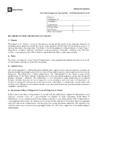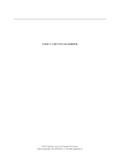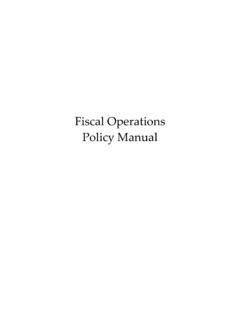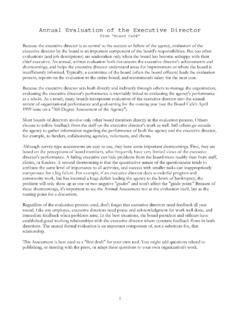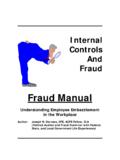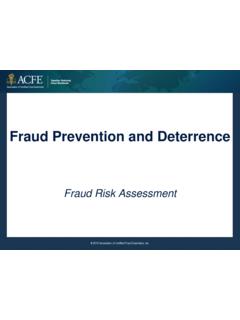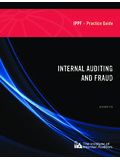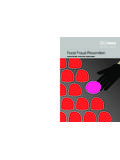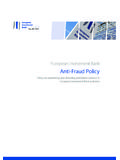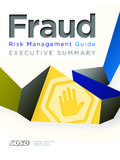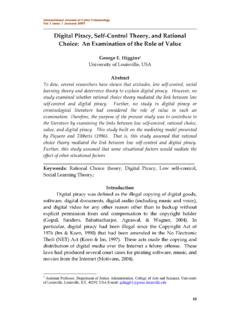Transcription of Fraud and Responsibilities of Audit Committee - NIQCA
1 Copyright 2005 AICPA, Inc. 1 Fraud and the Responsibilities of the Audit Committee : An Overview Purpose of This Tool. An Audit Committee should take an active role in the prevention and deterrence of Fraud , as well as an effective ethics and compliance program. The Audit Committee should constantly challenge management and the auditors to ensure that the entity has appropriate antifraud programs and controls in place to identify potential Fraud and ensuring that investigations are undertaken if Fraud is detected.
2 The Audit Committee should take an interest in ensuring that appropriate action is taken against known perpetrators of Fraud . This tool is intended to make Audit Committee members aware of their Responsibilities as they undertake this important role. This tool highlights areas of activity that may require additional scrutiny by the Audit Committee . Definition and Categories of Fraud An understanding of Fraud is essential for the Audit Committee to carry out its Responsibilities . The term Fraud is defined in Black s Law Dictionary (Sixth Edition, 1990) as: An intentional perversion of truth for the purpose of inducing another in reliance upon it to part with some valuable thing belonging to him or to surrender a legal right.
3 A false representation of a matter of fact, whether by words or by conduct, by false or misleading allegations, or by concealment of that which should have been disclosed, which deceives and is intended to deceive another so that he shall act upon it to his legal A generic term, embracing all multifarious means which human ingenuity can devise, and which are resorted to by one individual to get advantage over another by false suggestions or by suppression of truth, and includes all surprise, trick, cunning, dissembling, and any unfair way by which another is cheated.
4 The Audit Committee also needs to be aware that Fraud affecting the organization often falls within one of three categories: Management Fraud , which involves senior management s intentional misrepresentation of financial statements, or theft or improper use of company resources. Employee Fraud , which involves nonsenior employee theft or improper use of company resources. External Fraud , which involves theft or improper use of resources by people who are neither management, nor employees of the firm.
5 AICPA Audit Committee Toolkit: Not-for-Profit Organizations 2 This categorization of Fraud is useful, but not absolute. Middle management employees may intentionally misrepresent financial statement transactions, for example, to improve their apparent performance, or outside individuals may collude with company management or employees. Roles of the Audit Committee in the Prevention, Deterrence, Investigation, and Discovery or Detection of Fraud The members of the Audit Committee should understand their role of ensuring that the organization has antifraud programs and controls in place to help prevent Fraud , and aid in its discovery if it does occur, to properly fulfill their fiduciary duties of: 1.
6 Monitoring the financial reporting process. 2. Overseeing the internal control system. 3. Overseeing the internal Audit and independent public accounting functions. 4. Reporting findings to the board of directors. Guidance to boards of directors/trustees, Audit committees , and management to help prevent, deter, and detect Fraud is contained in the AICPA s Antifraud & Corporate Responsibility Resource Center available at The information contained in the center can be viewed from different user perspectives for a personalized focus on the issues.
7 Not-for-profit organizations (NPOs) can use the specific requirements for Audit committees as outlined in the Sarbanes-Oxley Act and the Securities Exchange Commission (SEC) rules as a guide. The requirements can be obtained from the AICPA Web site at The Audit Committee should ensure that the organization has implemented an effective ethics and compliance program, and that it is periodically tested. Since the occurrence of significant frauds can frequently be attributed to an override of internal controls, the Audit Committee plays an important role to ensure that internal controls address the appropriate risk areas and are functioning as designed.
8 Internal auditors and external auditors can serve a vital role in aiding in Fraud prevention and deterrence. Internal Audit staff and external auditors that are experienced and trained in Fraud prevention and deterrence can help to provide assurance that (1) risks are effectively identified and monitored, (2) organizational processes are effectively controlled and tested periodically, and (3) appropriate follow-up action is taken to address control weaknesses. The Audit Committee needs to ensure that internal and external auditors are carrying out their Responsibilities in connection with potential Fraud .
9 Fraud and the Responsibilities of the Audit Committee 3 Expertise of Forensic Accounting Consultants In some situations, it may be necessary for an organization to look beyond the independent Audit team for expertise in the Fraud area. In such cases, CPA forensic accounting consultants can provide additional assurance or advanced expertise, since they have special training and experience in Fraud prevention, deterrence, investigation, and detection. Forensic accounting consultants may also provide fresh insights into the organization s operations, control systems, and risks.
10 The work of forensic accounting consultants may also provide comfort for the organization s executive director and chief financial officer. Forensic accounting consultants, however, cannot act as an insurer to prevent or detect Fraud . When Fraud Is Discovered Fraud can be discovered through many sources, namely, internal or external auditors, forensic accounting consultants, employees, vendors, and others. Establishing a confidential hotline can also be an important source of information leading to Fraud discovery, as part of an organization s overall ethics, compliance, and Fraud prevention program.
